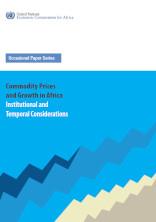Commodity Prices and Growth in Africa

The paper analyses the short run and long impact of commodity prices on real GDP per capita growth in 29 African countries over the period 1980-2013. The paper uses the latent-class panel error correction model that captures both short-run and long-run effects of commodity prices, while at the same time relaxing the assumption that countries do belong to a single growth regime or latent class. The key finding of this study suggests that using models which assume that countries can be classified in a single growth regime may result in misleading policy conclusions. More specifically, using a model which assumes that countries follow a single growth regime, shows that commodities have an unambiguous positive effect on growth in the short run, while in the long run the positive effect of commodity prices on growth is only conditional upon the existence of good quality institutions. However, when we relax the assumption of a single growth regime across countries, results suggest that the short-run and long-run impacts of commodity prices on growth are conditional on the growth regime that countries belong to, which is mostly contrary to the findings based on a single growth regime. There is need, therefore, for policymakers to avoid assuming that countries belong to a single growth regime when carrying out policy-oriented economic analysis, as this may lead to inappropriate policy recommendations.